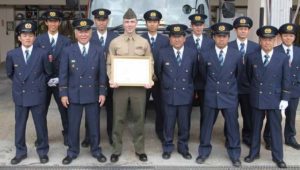The Warrior Ethos
When a U.S. Marine receives a direct order, he or she doesn’t ask questions. Instead, he figures out a way to carry it out. That could mean improvising a field-expedient antenna with a wire and a spoon, or an old railroad track; or facing off against a couple of 250-pounder combatants in martial arts training.
Getting things done is a necessary skill in the Marine Corps. It’s not a bad way to go in sales either.
“To be an active duty Marine for eight years is a blessing, and I wouldn’t be the man I am had I not served honorably,” says Eric Hansen, surgery center consultant for Cardinal Health in Austin/San Antonio, Texas. In the Marines, he learned about decisiveness, initiative, time management and about a hundred other things, he says. Though the stakes may be higher in the military, those traits are valuable in civilian life too.
Enlistment
 Born and raised in Chicago, Hansen enrolled at Eastern Illinois University in 2004, but ended up getting his undergrad degree 10 years later. That’s because he dropped out of school in the fall of 2007 to join the Marine Corps.
Born and raised in Chicago, Hansen enrolled at Eastern Illinois University in 2004, but ended up getting his undergrad degree 10 years later. That’s because he dropped out of school in the fall of 2007 to join the Marine Corps.
“I didn’t like the fact that I was 20 years old and in college, while 18-year-olds were in Fallujah or Mosul kicking down doors,” he says. “College could wait.”
He enlisted with an “open contract,” meaning he would accept any assignment that the Corps wanted or needed, and he reported to Marine Corps Recruit Depot (MCRD) San Diego for boot camp in March 2008. As it turns out, Hansen is a “closet nerd,” who taught himself how to code and build computers on his own. He was assigned to the 5900 field – electronics maintenance.
After a year of schooling in communications at 29 Palms, the Marine Corps training base in the Mojave Desert in Southern California, Hansen was deployed to Okinawa. Though the Marines were supporting a number of countries in the Pacific, much of his time was spent in the Philippines, whose armed forces were fighting Abu Sayyaf militants.
“I was on the ground side, where we would take a Humvee loaded with radios and equipment (MRQ-12) and be in forward positions ensuring the infantry was getting their support,” he explains. Later, he found himself working side by side with civilian contractors developing an airborne command center.
“Traditionally, a command center was on the ground,” he explains. “In order to stay with the fight, everyone would need to pack up and shift forward. This airborne project allowed us to outfit a C-130 [transport] with a team whose operators communicated with the ground forces to coordinate air strikes, casualty evacs, etc.”
Martial arts
After some time in communications, he made a transition to the Marine Corps Martial Arts Program, and graduated from the Martial Arts Instructor course as a first degree Black Belt. Soon afterward, he began “training Marines in hand-to-hand combat, offensive and defensive measures, and instilling a warrior ethos into their mindset.”
Hansen himself had taken some Tae Kwan Do lessons as a kid, but hadn’t pursued martial arts until he got to Okinawa. “When you go to boot camp, it’s surprising how many [recruits] have never thrown a punch,” he says. “That’s because it’s not a common thing.”
“I like conflict. I like showing what you can do to someone or something. And wearing a Black Belt is a source of pride in the Corps,” Hansen explains.
His last two years in the Marines – 2013 to 2015 – were spent at Naval Station Great Lakes, Illinois, where he managed both active and reserve Marines in the Chicago area. “The best part was working with Toys for Tots, where I managed the entire North Chicago area of operations, essentially doubling the amount of toys collected in back-to-back years.”
The most challenging part of those two years? The funerals.
“Nearly every week we would have to fill duty on a funeral team,” he says. “It always hit hard, just knowing we were burying a true patriot and warrior. Whether the Marine was a hundred years old and retired for many years, or a 19-year-old newlywed recently killed in Afghanistan. Every single time, we professionally filled our duties to our highest ability, because I know when I die, I’m getting that same service, that same song, same volley, and same flag.”
Pivot
In 2015, after his discharge, Hansen sought a change. “Perhaps it was being away from winter for eight years and experiencing a Polar Vortex. Who knows? I honestly looked at a map and chose a spot in sunny Austin, Texas. With a disability check in one hand and no job in the other, I went straight to Uber driving.”
A friend alerted him to an opportunity with Cardinal Health, servicing ambulatory surgery centers. It was a long shot, as Hansen had no experience in medical sales, let alone the OR.
“So I did what I do, and studied everything there is to know about Cardinal Health and ambulatory surgery centers, and went to the interview with the sole intention of it being a ‘practice’ interview.” But he got the job. “I couldn’t have been happier with the Cardinal Health leadership I met that day.”
Perhaps not unexpectedly, transition to civilian life – and to sales – came with some bumps. “You take a young kid, 20 years old, stick him in the Marine Corps on active duty for eight years, and then put him into a clinical setting. Though I acted confident, I really had no idea what was going on.” But he caught on.
“The earliest challenge I had was being sidelined constantly by either customer service issues, pricing discrepancies and contract issues,” he says “I would try to own the majority of these without delegating to our teams within Cardinal Health. Ultimately, that would cause me to have less time in the field.
“Once I figured out how to properly manage the internal gears of a Fortune 15 company like Cardinal Health, I was able to start doing what I love – selling.”
Hansen and his wife, Kathy, are expecting a baby in February. “Thanks to a co-worker/friend in Houston, I changed my mind [about knowing the sex of the baby], and plan on being surprised if it’s a girl or boy. She said ‘Eric, there are so few things in life that are true surprises.’ So I plan to have this be one of them.”
Sales lessons from the Corps
Eight years in the U.S. Marine Corps gave Eric Hansen some valuable tools to use in sales. Among them:
- Be hypersensitive to the intangibles of every aspect of the sales profession.
- Adopt the attitude that complacency is never an option.
- Learn how to change plans on the fly, making use of good reflexes – mental and physical.
- Get comfortable rolling with the punches, avoid overreacting, stay cool, calm and collected.
- Be a leader. “Military leaders make big decisions that affect the unit; if it’s a bad decision, Marines, soldiers, sailors or airmen can suffer casualties. Business leaders make decisions that affect their employees; they can result in great success or great failure, and even loss of a job.”
